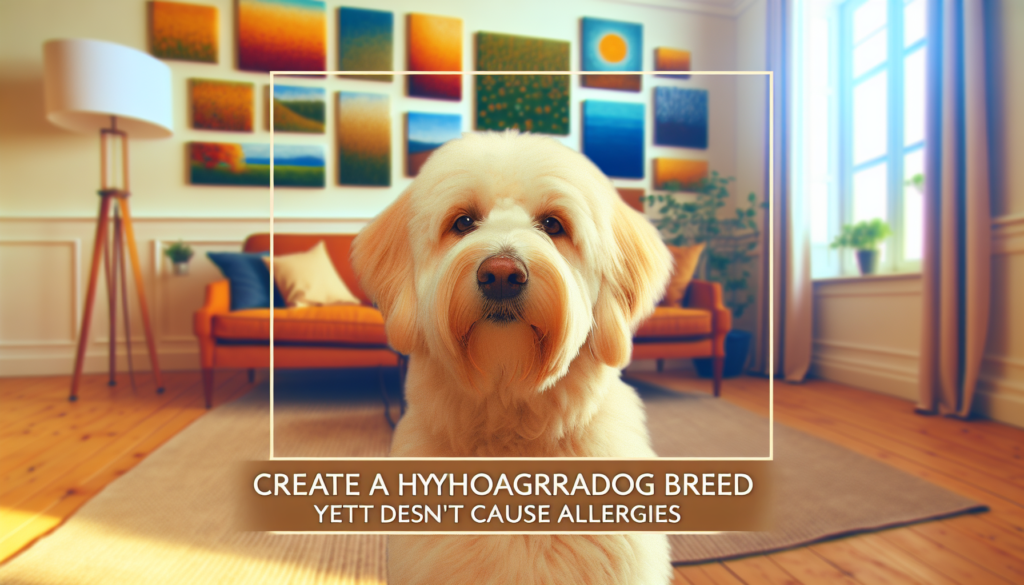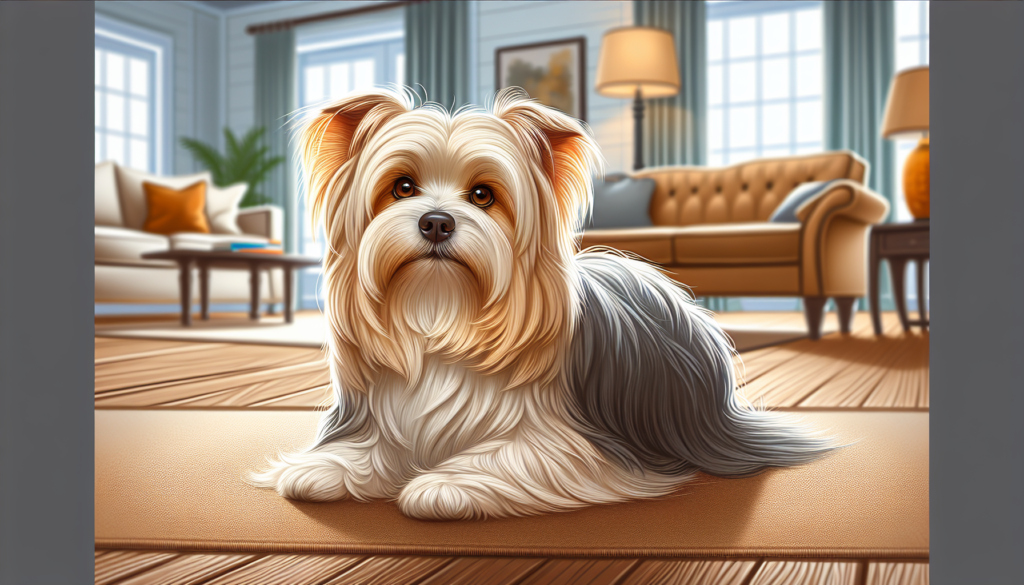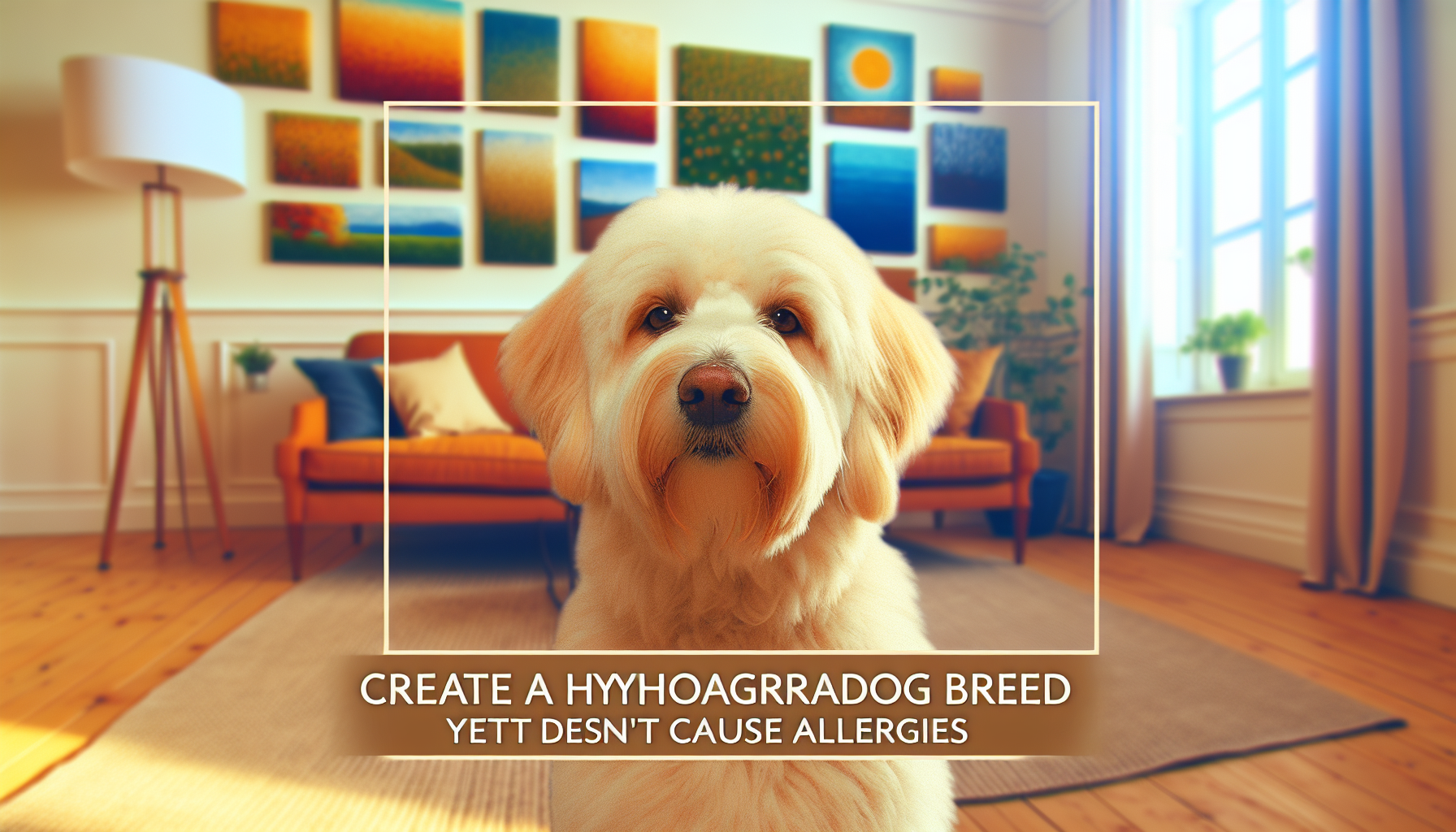If you’re one of the many dog lovers who unfortunately suffer from allergies, finding the perfect canine companion can be a challenge. However, fear not! In this article, we’ll explore the best dog breeds for people with allergies, so you can enjoy the company of a furry friend without sneezing or itching your way through each day. Whether you have mild or severe allergies, there’s a dog breed out there that is hypoallergenic and perfectly suited to your needs. Say goodbye to watery eyes and stuffy noses, and say hello to a life filled with love and loyalty from your new four-legged friend.

Hypoallergenic Dog Breeds
What does hypoallergenic mean?
Hypoallergenic refers to a type of dog breed that is less likely to cause allergies in humans. While no dog breed is completely hypoallergenic, hypoallergenic breeds produce fewer allergens compared to other breeds. This is particularly important for individuals who are allergic to pet dander or have sensitive respiratory systems.
Characteristics of hypoallergenic dog breeds
Hypoallergenic dog breeds often have hair instead of fur, which reduces the amount of shedding and dander they produce. These breeds typically have a single coat of hair, and their hair grows continuously, similar to human hair, rather than going through regular shedding cycles. Additionally, hypoallergenic breeds tend to have a low tendency to drool, minimizing the presence of allergenic saliva.
Popular hypoallergenic dog breeds
Some popular hypoallergenic dog breeds include:
- Maltese: Known for their silky, hypoallergenic coats and friendly personalities, Maltese dogs are a great choice for allergy sufferers.
- Shih Tzu: With their luxurious, hypoallergenic hair, Shih Tzus make lovable companions for those with allergies.
- Yorkshire Terrier: These small, hypoallergenic dogs have a beautiful coat of hair that requires regular grooming.
- Bichon Frise: Bichon Frises have curly, hypoallergenic hair and are known for their playful and affectionate nature.
- Portuguese Water Dog: This hypoallergenic breed has a thick, curly coat that requires regular maintenance but is suitable for individuals with allergies.
Non-Shedding Dog Breeds
Benefits of non-shedding dog breeds
Non-shedding dog breeds offer numerous benefits for individuals with allergies. Since they do not shed fur like other breeds, non-shedding dogs release fewer allergens into the environment, reducing the risk of triggering allergic reactions. This can make living with a dog more comfortable for allergy sufferers.
Characteristics of non-shedding dog breeds
Non-shedding dog breeds often have hair that grows continuously and requires regular grooming to prevent matting. These breeds typically shed very little or not at all, keeping allergens to a minimum. Additionally, non-shedding dog breeds may have a single coat or a double coat with hair that does not shed as frequently as fur.
Popular non-shedding dog breeds
Some popular non-shedding dog breeds include:
- Poodle: Poodles come in different sizes and have curly, non-shedding hair that makes them a popular choice for allergy sufferers.
- Bichon Frise: As mentioned earlier, Bichon Frises have a hypoallergenic coat that doesn’t shed.
- Yorkipoo: A cross between a Yorkshire Terrier and a Poodle, Yorkipoos inherit the non-shedding traits of both breeds.
- Chinese Crested: This hairless breed is an excellent choice for individuals with severe allergies, as they have no fur to shed.
- Havanese: Havanese dogs have long, silky hair that doesn’t shed excessively, making them a suitable option for allergy sufferers.
Small Dog Breeds
Advantages of small dog breeds for people with allergies
Small dog breeds can be advantageous for individuals with allergies in several ways. Firstly, their smaller size means they produce fewer allergens overall. Additionally, their compact size makes it easier to keep their living environment clean and free of allergens. Small dogs also require less exercise and space, which can be beneficial for individuals with limited living arrangements.
Characteristics of small dog breeds
Small dog breeds typically have lower dander production, as their smaller bodies create fewer skin cells that contain allergenic proteins. Moreover, small breeds often have shorter coats, reducing the amount of hair and dander they shed. Their small size also means less saliva and allergenic proteins are present when they lick themselves or their owners.
Popular small dog breeds
Some popular small dog breeds suitable for people with allergies include:
- Cavalier King Charles Spaniel: These affectionate dogs have long, silky hair that requires regular grooming but doesn’t shed excessively.
- Miniature Schnauzer: Miniature Schnauzers have a wiry, hypoallergenic coat that makes them a great choice for allergy sufferers.
- West Highland White Terrier: Known for their white, low-shedding coats, Westies are a great option for individuals with allergies.
- Shih Tzu: Shih Tzus, as mentioned earlier, have hair that is less allergenic and requires regular grooming to prevent matting.
- Boston Terrier: These small and friendly dogs have a short coat that sheds minimally, making them suitable for allergy sufferers.
Hairless Dog Breeds
Benefits of hairless dog breeds for people with allergies
Hairless dog breeds offer unique benefits for individuals with allergies. Since they have no hair to shed, these breeds release significantly fewer allergens into the environment. Additionally, their lack of hair reduces the presence of dander, making them a good option for those with sensitivities to pet dander.
Characteristics of hairless dog breeds
Hairless dog breeds, as the name suggests, lack a coat of fur. Instead, they may have a thin layer of hair or fuzz. These breeds often have smooth and warm skin, which requires regular moisturizing to prevent dryness. Despite their lack of hair, hairless dog breeds still need grooming to keep their skin clean and healthy.
Popular hairless dog breeds
Some popular hairless dog breeds suitable for people with allergies include:
- Xoloitzcuintli (Mexican Hairless): This ancient breed comes in different sizes and has little to no hair, making it an excellent choice for allergy sufferers.
- Chinese Crested: As mentioned earlier, the Chinese Crested can be hairless or have a powderpuff coat, with both varieties being suitable for individuals with allergies.
- American Hairless Terrier: This breed is completely hairless and has skin that is prone to sunburn and dryness, requiring special care and attention.
- Peruvian Inca Orchid: The Peruvian Inca Orchid is a hairless breed with soft skin and minimal dander production, making it hypoallergenic.

Single-Coat Dog Breeds
Advantages of single-coat dog breeds for people with allergies
Single-coat dog breeds offer specific advantages for individuals with allergies. Since they have only one coat of hair, they shed less and produce fewer allergens. This can be beneficial in minimizing allergic reactions and keeping the living environment more comfortable for allergy sufferers.
Characteristics of single-coat dog breeds
Single-coat dog breeds have a single layer of hair, which may range in thickness and texture. These breeds typically shed less than double-coated breeds since they do not have the additional undercoat. Additionally, single-coat breeds may have hair that grows continuously, similar to human hair, rather than shedding seasonally like fur.
Popular single-coat dog breeds
Some popular single-coat dog breeds suitable for people with allergies include:
- Greyhound: Known for their sleek and short coats, Greyhounds shed minimally and require minimal grooming.
- Basenji: This breed has a short, single coat that doesn’t shed excessively, making them a great option for individuals with allergies.
- Boxer: Boxers have a short and smooth coat that is easy to maintain and doesn’t shed heavily.
- Italian Greyhound: Similar to the Greyhound, Italian Greyhounds have a short coat that is hypoallergenic and requires minimal grooming.
Dog Breeds with Low Dander
What is dander and why is it important for allergies?
Dander refers to tiny particles of dead skin cells that animals, including dogs, shed regularly. These skin cells contain allergenic proteins that can trigger allergic reactions in sensitive individuals. For people with allergies, finding dog breeds with low dander production is crucial in reducing the risk of allergic symptoms and maintaining a more comfortable living environment.
Characteristics of dog breeds with low dander
Dog breeds with low dander production have lower levels of allergenic proteins in their shed skin cells. These breeds often have smaller skin cells or produce fewer of them, resulting in reduced dander production. Additionally, dog breeds with low dander may also have hair instead of fur or possess specific genetic traits that contribute to minimal dander release.
Popular dog breeds with low dander
Some popular dog breeds with low dander suitable for people with allergies include:
- Poodle: As mentioned earlier, Poodles have hair that continuously grows and requires regular grooming, which helps to minimize dander dispersion.
- Bichon Frise: Bichon Frises, with their hypoallergenic coats, are also known for their low dander production.
- Shih Tzu: Shih Tzus have hair instead of fur and produce less dander, making them a good choice for individuals with allergies.
- Soft-Coated Wheaten Terrier: This terrier breed has a soft and silky coat that doesn’t shed excessively and produces minimal dander.
- Irish Water Spaniel: Irish Water Spaniels have curly and low-shedding coats that contribute to lower dander levels.
Medium-Sized Dog Breeds
Benefits of medium-sized dog breeds for people with allergies
Medium-sized dog breeds offer several advantages for individuals with allergies. Their moderate size often means they produce fewer allergens compared to larger breeds. Additionally, medium-sized dogs typically require less living space and exercise compared to larger breeds, making them more manageable for individuals with allergies living in smaller or urban homes.
Characteristics of medium-sized dog breeds
Medium-sized dog breeds generally have a balanced body structure and moderate coat length. This combination often results in reduced dander production and shedding compared to larger breeds. While the specific characteristics and grooming needs may vary between breeds, medium-sized dogs generally release fewer allergens into the environment.
Popular medium-sized dog breeds
Some popular medium-sized dog breeds suitable for people with allergies include:
- Cocker Spaniel: Cocker Spaniels have medium-length hair and shed minimally, making them a good option for allergy sufferers.
- Australian Terrier: With a hypoallergenic coat that doesn’t shed excessively, Australian Terriers are suitable for individuals with allergies.
- Portuguese Water Dog: This medium-sized breed, as mentioned earlier, has a low-shedding and hypoallergenic curly coat that reduces allergen exposure.
- Samoyed: Samoyeds have a luxurious double coat, but surprisingly, they are considered hypoallergenic due to their low dander production.
- Keeshond: Keeshonds have a thick double coat that requires regular grooming but is relatively low in allergenic dander production.
Poodle Mixes
Advantages of poodle mixes for people with allergies
Poodle mixes, commonly known as “Doodle” breeds, offer unique advantages for individuals with allergies. Since Poodles themselves are hypoallergenic, breeding them with other breeds creates offspring that inherit their hypoallergenic traits. Poodle mixes often have hair that doesn’t shed excessively, making them suitable for those with allergies.
Characteristics of poodle mixes
Poodle mixes can come in various sizes, colors, and coat types depending on the other breed in the mix. However, due to their Poodle ancestry, these mixes often have hair that requires regular grooming but sheds less and produces less dander compared to other breeds. Poodle mixes often combine the intelligence and charming personalities of Poodles with the desirable traits of another breed.
Popular poodle mixes
Some popular poodle mixes suitable for people with allergies include:
- Labradoodles: A cross between a Labrador Retriever and a Poodle, Labradoodles are known for their low-shedding and hypoallergenic coats.
- Goldendoodles: This mix between a Golden Retriever and a Poodle produces offspring with low-allergen and low-shedding hair.
- Cavapoo (Cavalier King Charles Spaniel and Poodle mix): Cavapoos have hair that is less allergenic and is typically curly or wavy.
- Cockapoo (Cocker Spaniel and Poodle mix): Cockapoos inherit the hypoallergenic traits of Poodles while combining them with the friendly nature of Cocker Spaniels.
- Bernedoodle (Bernese Mountain Dog and Poodle mix): Bernedoodles often have wavy or curly hair that is hypoallergenic, making them suitable for allergy sufferers.
Terrier Breed Group
Why terrier breeds are often recommended for people with allergies
Terrier breeds are often recommended for people with allergies due to their unique coat characteristics. Many terriers have wiry or coarse hair that sheds minimally and produces fewer allergenic proteins. Additionally, terriers often have a single coat of hair rather than a double coat, further reducing dander release.
Characteristics of terrier breeds
Terrier breeds come in various sizes and coat types, but they often share similar characteristics that make them suitable for allergy sufferers. Terriers typically shed less compared to other breeds, and their wiry or coarse hair may trap dander closer to the body, decreasing its dispersion into the environment. Terriers are also known for their feisty personalities and loyalty.
Popular terrier breeds
Some popular terrier breeds suitable for people with allergies include:
- Soft-Coated Wheaten Terrier: As mentioned earlier, Wheaten Terriers have a soft and silky coat that sheds minimally and produces low levels of dander.
- Cairn Terrier: Cairn Terriers have a rough, weather-resistant coat that sheds less and is considered hypoallergenic.
- Yorkshire Terrier: Yorkies, listed as a hypoallergenic breed earlier, have beautiful, single coats of hair that require regular grooming.
- Bedlington Terrier: Bedlingtons have a unique and curly coat that doesn’t shed excessively and produces minimal dander.
- West Highland White Terrier: Westies, also mentioned earlier, have a low-shedding and hypoallergenic white coat that makes them suitable for allergy sufferers.
Working Dog Breeds
Benefits of working dog breeds for people with allergies
Working dog breeds offer several benefits for individuals with allergies. These breeds are often intelligent, trainable, and have specific roles and tasks they excel at. Working dogs, with their low-shedding or hypoallergenic coats, can provide companionship and assistance to individuals with allergies without causing excessive allergic reactions.
Characteristics of working dog breeds
Working dog breeds come in various sizes and coat types, but many of them possess characteristics that contribute to their hypoallergenic nature. These breeds often have hair that grows continuously rather than shedding regularly. Likewise, their coat texture and structure may help trap dander, fur, and allergens, reducing their dispersion into the environment.
Popular working dog breeds
Some popular working dog breeds suitable for people with allergies include:
- Portuguese Water Dog: This breed, mentioned earlier, has a hypoallergenic and low-shedding curly coat that is suitable for allergy sufferers.
- Standard Schnauzer: Standard Schnauzers have a wiry, low-shedding coat that makes them a good choice for individuals with allergies.
- Giant Schnauzer: Similar to the Standard Schnauzer, the Giant Schnauzer has a hypoallergenic coat that sheds minimally.
- Bichon Frise: Bichon Frises, also mentioned earlier, are known for their hypoallergenic coats and playful personalities.
- Airedale Terrier: Airedales have a wiry coat and shed minimally, making them a great option for individuals with allergies.
In conclusion, there are various dog breeds that are considered suitable for individuals with allergies. Hypoallergenic breeds, non-shedding breeds, small breeds, hairless breeds, single-coat breeds, low-dander breeds, medium-sized breeds, poodle mixes, terrier breeds, and working dog breeds all offer unique attributes that make them more compatible with allergy sufferers. However, it is important to remember that allergies can vary from person to person, and individual reactions can differ. Therefore, it is crucial to spend time with a potential dog breed to ensure compatibility and consult with a medical professional before bringing a new dog into a household with allergy concerns. With careful consideration and proper care, individuals with allergies can enjoy the companionship and love of a dog without compromising their health and well-being.

